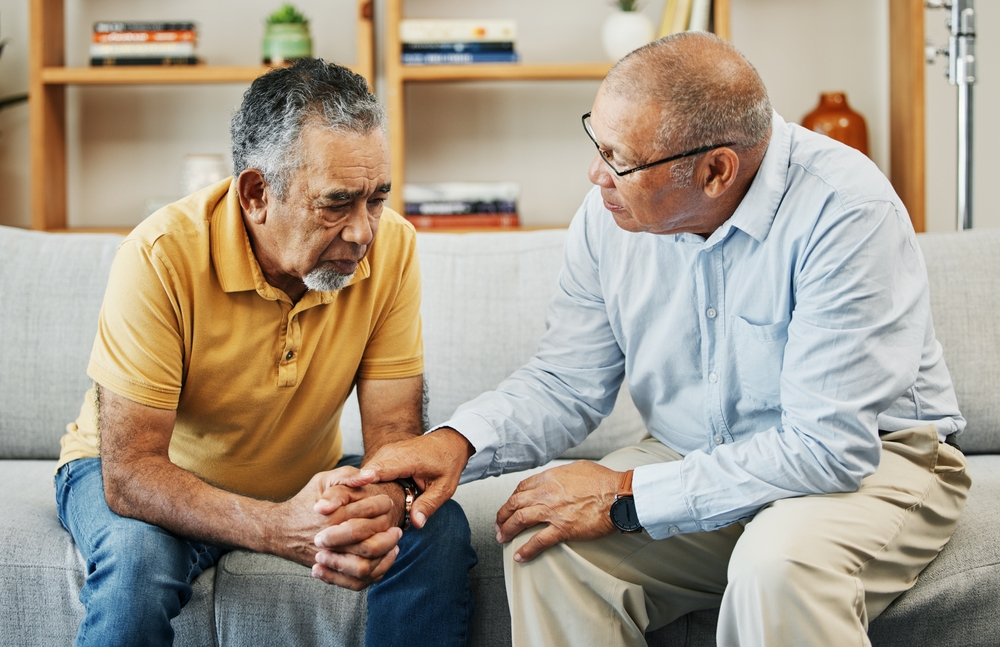Feeling down is a part of life, and sometimes that sadness can feel really heavy. It's like a cloud that just won't move. But you don't have to go through it alone. Finding ways to get emotional pain support can make a big difference. This guide is here to help you figure out how to deal with those tough feelings and find some peace.
Key Takeaways
- Recognize that emotional pain is real and it's okay to feel it. Acknowledging your feelings is the first step.
- Build a support system. Talk to friends, family, or find people who get what you're going through.
- Try simple ways to cope, like taking a walk, drawing, or just sitting quietly for a bit.
- Don't hesitate to get professional help if you need it. Therapists are trained to offer emotional pain support.
- Take care of yourself. Small acts of self-care and setting boundaries are important for your well-being.
Understanding Your Emotional Pain
Feeling down sometimes is just part of being human, you know? It's like a cloudy day – it happens, and it doesn't mean the sun won't come out again. But when those clouds stick around, or feel extra heavy, it’s good to know what’s going on. Understanding what emotional pain feels like is the first step to feeling better.
Recognizing The Signs
So, how do you know if what you're feeling is more than just a bad mood? It can show up in a bunch of ways. Maybe you're feeling tired all the time, even after sleeping. Or perhaps you've lost interest in things you used to love doing. Some people get really irritable, snapping at friends or family over little things. Others might feel a constant knot in their stomach or have trouble sleeping. It’s not always obvious, and it can be different for everyone. Paying attention to these changes in how you feel and act is super important. It’s like your body and mind sending you a signal that something needs attention.
It's Okay To Not Be Okay
Seriously, it is. We live in a world that sometimes pushes us to always be happy and strong, but that’s just not realistic. It’s perfectly fine to have days, or even weeks, where you’re not feeling your best. Trying to pretend everything is great when it’s not can actually make things harder. It’s okay to feel sad, angry, confused, or whatever else comes up. You don't have to put on a brave face all the time. Giving yourself permission to feel what you're feeling is a big deal.
Sometimes, when people are hurting, they might try to numb the feelings with things like alcohol or drugs. It seems like a quick fix, but it usually makes the underlying problems worse in the long run. It's better to find healthier ways to deal with the tough stuff.
The Power Of Acknowledgment
Once you start to notice these feelings, the next step is just to acknowledge them. You don't have to fix them right away, or even understand them completely. Just saying to yourself, “Okay, I'm feeling really low right now,” or “This situation is making me upset,” can be incredibly freeing. It’s like opening a window and letting some fresh air in. This simple act of acknowledgment can take away some of the power those difficult emotions have over you. It’s the start of being kinder to yourself and beginning the journey toward healing. You can find some helpful tips on managing difficult emotions at mental health resources.
Building Your Support Network
Feeling down can make you want to pull the covers over your head and just disappear for a while. It's totally normal to feel that way. But here's the thing: you don't have to go through this alone. Building a solid support system is like creating a safety net for your emotional well-being. It’s about surrounding yourself with people who genuinely care and can offer a listening ear or a helping hand when you need it most.
Connecting With Loved Ones
Sometimes, the people closest to us are the first ones we should turn to. Think about your family, your long-time friends, or even a trusted colleague. Reaching out might feel awkward at first, especially if you're not used to sharing your struggles. But often, the people who love you want to be there for you, they just don't know how unless you tell them. Start small. Maybe just a text saying you're having a rough day, or ask if they have time for a quick chat. You might be surprised by how much comfort a simple conversation can bring. Remember, vulnerability can actually strengthen your relationships.
Finding Your Tribe
Beyond your immediate circle, there are communities and groups where you can find people who understand exactly what you're going through. This could be a support group for a specific issue you're facing, an online forum, or even a hobby group where you connect with like-minded individuals. Sharing experiences with others who have similar struggles can be incredibly validating. It helps you realize you're not the only one feeling this way, and you can learn new ways to cope from their journeys. Finding your tribe can make a huge difference.
The Role Of Professionals
While friends and family are amazing, sometimes you need a different kind of support. This is where professionals come in. Therapists, counselors, and coaches are trained to help people work through emotional pain. They provide a safe, non-judgmental space to explore your feelings and develop strategies for managing them. Think of them as guides who can help you understand your emotions better and find your way forward. They offer a unique perspective and tools that can be incredibly effective. Many people find that talking to a professional is a really positive step towards healing, and it's a sign of strength to seek out professional mental health support.
It's important to remember that building a support network isn't a one-time event; it's an ongoing process. Nurturing these connections takes effort, but the rewards are immense. Having people in your corner can make even the toughest days feel more manageable.
Coping Strategies For Brighter Days
Feeling down is tough, but you've got tools to help you feel better. It's all about finding what works for you to get through those rough patches and start seeing some sunshine again. We're talking about strategies that can genuinely make a difference in your day-to-day.
Mindfulness and Meditation
This is about being present, right here, right now. It sounds simple, but it's powerful. When your mind is racing with worries, taking a few moments to just focus on your breath can really calm things down. You don't need to be a guru to try it. Just find a quiet spot, close your eyes, and pay attention to the air going in and out of your lungs. It's a way to step off the emotional rollercoaster for a bit.
Sometimes, just noticing the physical sensations of your breath can anchor you when everything else feels shaky. It’s a small act of self-kindness.
Creative Expression
Got a creative spark? Use it! Whether it's doodling, writing in a journal, playing an instrument, or even cooking, letting your creativity flow can be a fantastic outlet. It’s not about being perfect; it’s about the process. Pouring your feelings into something tangible can feel really good, like you’re giving your emotions a voice without having to speak them aloud. It’s a way to process what’s going on inside.
Gentle Movement
When you're feeling low, the last thing you might want to do is exercise. But gentle movement can be a game-changer. Think a leisurely walk in the park, some light stretching, or even just dancing around your living room to your favorite song. It gets your blood flowing and can release endorphins, those feel-good chemicals. You don't need to run a marathon; just moving your body in a way that feels good can lift your spirits. Connecting with loved ones can also be a great way to get support, and sharing your feelings with a trusted friend can be incredibly validating. Seeking support is key.
These strategies aren't magic cures, but they are practical ways to help you manage emotional pain and move towards brighter days. Experiment with them and see what brings you a sense of peace and relief.
Seeking Professional Emotional Pain Support
Sometimes, even with the best intentions and a solid support system, emotional pain can feel like a really heavy weight. It’s totally normal to feel like you need a little extra help to sort through things. Reaching out for professional support isn't a sign of weakness; it's actually a really brave step towards feeling better.
When To Reach Out
It can be tough to know when it’s time to call in the pros. Here are a few signs that might mean it’s time to consider professional help:
- Your feelings are consistently overwhelming and hard to manage.
- You're having trouble with daily tasks like sleeping, eating, or working.
- You're relying on unhealthy coping mechanisms, like excessive drinking or isolation.
- You feel hopeless or like things will never get better.
If any of this sounds familiar, it might be a good idea to talk to someone. Remember, you don't have to go through this alone. If you're in crisis, confidential help is available 24/7 through the 988 Suicide & Crisis Lifeline.
Types Of Therapy
There are lots of different ways professionals can help, and what works for one person might not work for another. It’s all about finding the right fit for you. Some common approaches include:
- Cognitive Behavioral Therapy (CBT): This helps you identify and change negative thought patterns and behaviors.
- Dialectical Behavior Therapy (DBT): Often used for intense emotions, DBT teaches skills for managing distress and improving relationships.
- Psychodynamic Therapy: This looks at how past experiences might be influencing your current feelings and behaviors.
- Group Therapy: Sharing experiences with others who are going through similar things can be incredibly validating and helpful.
Finding The Right Therapist
Finding a therapist you connect with is super important. Think of it like finding a good friend – you want someone you feel comfortable talking to and who understands you. Don't be afraid to ask questions during an initial consultation. You might want to ask about their experience with the specific issues you're facing, their approach to therapy, and what a typical session looks like. It’s okay to meet with a few different people before you find the one who feels like the best match. Your mental well-being is worth the effort to find the right support.
Nurturing Your Well-being
Taking care of yourself isn't just a nice idea; it's a necessary part of healing and moving forward. Think of it like tending to a garden. You can't expect beautiful flowers if you don't water them, pull the weeds, and give them sunshine. The same goes for your emotional health. It requires consistent, gentle attention.
Self-Care Isn't Selfish
Sometimes, we get caught up in thinking that putting ourselves first is a bad thing. But honestly, it's not. When you're running on empty, you don't have much to give to anyone else, right? Prioritizing activities that recharge you, whether it's reading a book, taking a long bath, or just having a quiet cup of tea, is actually a way to make sure you can be there for others, and more importantly, for yourself. It's about filling your own cup so you have something to pour out. Remember, you deserve to feel good, and taking time for yourself is a big part of that. It’s about practicing self-compassion by speaking to yourself with kindness and encouragement, similar to how you would treat a friend. Practice self-compassion.
Setting Healthy Boundaries
Boundaries are like the fences around your garden. They protect what's important and keep out what could be harmful. This means learning to say ‘no' when you're feeling overwhelmed, or limiting contact with people who consistently drain your energy. It's not about being mean; it's about protecting your peace. Setting boundaries can feel awkward at first, but it's a really important skill for maintaining your emotional balance. It helps you manage your energy and prevents burnout.
Celebrating Small Victories
When you're going through a tough time, it's easy to focus only on what's not going well. But taking a moment to acknowledge the little wins can make a huge difference. Did you get out of bed today when it felt impossible? That's a win. Did you manage to have a conversation without feeling completely overwhelmed? That's a win too.
It's important to recognize that progress isn't always a straight line. There will be ups and downs, and that's perfectly normal. Don't let the tough days overshadow the progress you've already made.
Make a point to notice these moments. Maybe keep a journal where you jot down one small thing you accomplished each day. It helps build momentum and reminds you that you are capable of moving forward, even when it feels slow. These small acknowledgments add up, building a foundation of resilience.
Keep Going, You've Got This!
So, we've talked about a lot of ways to get through tough times. Remember, it's okay to feel what you're feeling, and reaching out for help isn't a sign of weakness, it's actually pretty brave. Whether it's talking to a friend, finding a good therapist, or just taking some time for yourself, there are options out there. You don't have to go through this alone. Keep trying different things until you find what works for you. Things can and will get better, and you're stronger than you think. Take it one day at a time.
Frequently Asked Questions
What exactly is emotional pain?
Emotional pain is that heavy feeling you get when something sad, upsetting, or difficult happens. It's like a hurt inside your mind or heart, not a physical scrape or bruise. Things like losing someone, feeling left out, or dealing with big changes can cause it.
Is it normal to feel bad sometimes?
It's totally fine to feel down or sad sometimes. Everyone goes through tough times. You don't have to pretend to be happy when you're not. Letting yourself feel your feelings is a big step in getting better.
How can talking to others help me?
Talking to friends, family, or even a teacher you trust can make a huge difference. Sharing what's bothering you with someone who cares can lighten the load and help you feel less alone.
What are some simple ways to feel better when I'm hurting?
Things like deep breathing, listening to calm music, or doodling can help soothe your feelings. Even a short walk outside can clear your head and make you feel a bit better.
When should I ask for help from a professional?
If the sadness or worry feels too big to handle on your own, or if it lasts for a long time, it's a good idea to talk to a grown-up like a school counselor or a doctor. They have special ways to help you work through tough feelings.
What does ‘taking care of yourself' mean?
Taking care of yourself means doing things that make you feel good, like getting enough sleep, eating healthy foods, and doing activities you enjoy. It's not selfish; it's necessary to keep yourself strong and healthy, inside and out.



